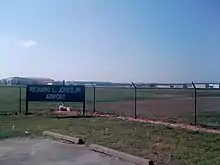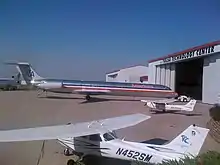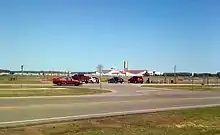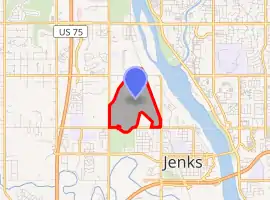Richard Lloyd Jones Jr. Airport
Richard Lloyd Jones Jr. Airport, a/k/a Jones–Riverside Airport (IATA: RVS[2], ICAO: KRVS, FAA LID: RVS) is a city-owned, public-use airport located five nautical miles (6 mi, 9 km) south of the central business district of Tulsa, a city in Tulsa County, Oklahoma, United States.[1] It is included in the National Plan of Integrated Airport Systems for 2011–2015, which categorized it as a general aviation facility and reliever airport[3] for Tulsa International Airport.
Richard Lloyd Jones Jr. Airport | |||||||||||||||||||
|---|---|---|---|---|---|---|---|---|---|---|---|---|---|---|---|---|---|---|---|
 | |||||||||||||||||||
| Summary | |||||||||||||||||||
| Airport type | Public | ||||||||||||||||||
| Owner | City of Tulsa | ||||||||||||||||||
| Serves | Tulsa, Oklahoma | ||||||||||||||||||
| Elevation AMSL | 638 ft / 194 m | ||||||||||||||||||
| Coordinates | 36°02′23″N 095°59′05″W | ||||||||||||||||||
| Website | TulsaAirports.com/... | ||||||||||||||||||
| Map | |||||||||||||||||||
 RVS Location of airport in Oklahoma / United States  RVS RVS (the United States) | |||||||||||||||||||
| Runways | |||||||||||||||||||
| |||||||||||||||||||
| Statistics (2010) | |||||||||||||||||||
| |||||||||||||||||||
Jones Airport is one of the busiest in the United States in terms of aircraft operations. In 2005, it had 347,000 operations, enough to rank it fourth among general aviation (GA) airports and thirtieth among all airports, according to a 2007 FAA report. It also was the busiest in Oklahoma, outranking both Will Rogers World Airport and Tulsa International.[4]
History

In the 1950s, the city of Tulsa decided to build a second airport to alleviate congestion around Tulsa International Airport. A consulting group hired by the city performed a site selection study. In February, 1955, the group recommended a site on the west side of the Arkansas River, just north of Jenks, Oklahoma. Construction began in 1957.
The facility was originally called Riverside Airport, but was renamed in 1978 for Richard Lloyd Jones Jr., late publisher of the Tulsa Tribune.[5] It opened on July 3, 1958. At that time, the airport had one 4,000-foot (1,200 m) long runway, an aircraft ramp, and one concrete building. By 1965, there were enough operations to justify building an air traffic control tower. The number of take-offs and landings exceeded 300,000 in 1978. In 1989, the airport installed an instrument landing system (ILS).[6]
In 1967, the Tulsa Airports Improvement Trust (TAIT) was established as a public trust to operate, construct and maintain airport facilities on behalf of the city of Tulsa. TAIT has no authority to levy taxes and depends on airport revenues to repay any airport-related debts. TAIT is independent of the city, but all board members are appointed by the Mayor of Tulsa and confirmed by the City Council. In October 1978, TAIT leased all city aviation facilities other than police and fire heliports to the city of Tulsa acting through the Tulsa Airport Authority (TAA), which agreed to disburse all airport-related income to TAIT. In July 1989, a lease amendment gave daily airport operation and maintenance responsibility to the TAA.[7]:13
Throughout the past fifty years, the airport has grown to become a hub of business and economic activity for the Tulsa region. It now includes three runways, over two hundred commercial and private hangars, and over 500 based aircraft. In 2008, RVS was the fifth busiest general aviation airport in the country.[8] Much of the airport's activity comes directly from its seven flight schools. Including Tulsa Community College Professional Pilot School and Spartan College of Aeronautics and Technology.[9] On 1 April 2011 an MD-80 donated by American Airlines was flown to the airport to replace the aging Boeing 727 then used for training Tulsa Technology Center students.[10][11][12]
Facilities and aircraft
Richard Lloyd Jones Jr. Airport covers an area of 664 acres (269 ha) at an elevation of 638 feet (194 m) above mean sea level. It has three runways with asphalt surfaces: 1L/19R is 5,102 by 100 feet (1,555 x 30 m); 1R/19L is 4,208 by 100 feet (1,283 x 30 m); 13/31 is 2,641 by 50 feet (805 x 15 m).[1] 120 acres (0.49 km2) are leased to the Tulsa County Board of Commissioners for the operation of South Lakes Golf Course.[13]
For the 12-month period ending November 30, 2010, the airport had 209,328 aircraft operations, an average of 573 per day: 99.5% general aviation and 0.5% air taxi. At that time there were 270 aircraft based at this airport: 80% single-engine, 10% multi-engine, 7% jet, and 3% helicopter.[1]
Airport observation area

| Airport Observation Area | |
|---|---|

| |
| Type | Observation Area |
| Location | Richard Lloyd Jones Jr. Airport |
| Coordinates | 36°01′55″N 95°59′26″W |
| Area | 0.6 acres (2,400 m2) |
| Created | 2009 |
| Operated by | Tulsa Airport Authority |
| Open | All year |
| Website | http://tulsaairports.com/index.cfm?id=83&tertFlag=6 |
In 2009 and again in 2010 the TAA held fundraising golf tournaments to create what they called "a first-class observation area" in an effort to discourage drivers from pulling over on 91st street directly adjacent to the airport to watch the aircraft landing. They initially built six parking spaces outside the fence on the southwest side of the airport. Since the two golf tournaments the TAA has begun to sell brick pavers around the gazebo that will be built on the site and they have begun selling taxiway lights that have been removed and replaced by LED lights, and rewired as LED desk lamps. When complete the observation area will have a gazebo, security guard shack, and restroom. Currently an elevated viewing platform, enlarged airport diagram, and six picnic tables on concrete slabs have been completed and installed. Thus far all the work on the observation area has been completed by Tulsa Airport Authority employees except for the enlarged airport diagram which was completed as part of a Boy Scout Eagle project.[14]
References
- FAA Airport Form 5010 for RVS PDF. Federal Aviation Administration. Effective May 31, 2012.
- "IATA Airport Code Search (RVS: Tulsa / R. Lloyd Jones)". International Air Transport Association. Retrieved December 15, 2012.
- "2011–2015 NPIAS Report, Appendix A" (PDF, 2.03 MB). National Plan of Integrated Airport Systems. Federal Aviation Administration. October 4, 2010. External link in
|work=(help) - Brockway, p. 40.
- Brockway, p. 39.
- Brockway, p. 39
- "Tulsa Airports Improvement Trust (A Component Unit of the City of Tulsa, Oklahoma) FINANCIAL REPORT June 30, 2011 and 2010" (PDF). www.sai.ok.gov. Tulsa Airports Improvement Trust. 5 December 2011. Retrieved 1 January 2020.
- "Archived copy" (PDF). Archived from the original (PDF) on 2011-08-28. Retrieved 2012-04-08.CS1 maint: archived copy as title (link)
- "Archived copy". Archived from the original on 2012-02-07. Retrieved 2012-04-08.CS1 maint: archived copy as title (link)
- "Tulsa Tech Gets Retired American Airlines MD-80". Retrieved 26 January 2018.
- "American Airlines Jet Makes Final Flight, Meets Challenge Of Landing At Jones Riverside". Retrieved 26 January 2018.
- "Tulsa Tech Dedicates New MD-80 From American Airlines". Retrieved 26 January 2018.
- "Archived copy" (PDF). Archived from the original (PDF) on July 17, 2011. Retrieved September 25, 2008.CS1 maint: archived copy as title (link)
- "Archived copy". Archived from the original on 2012-02-12. Retrieved 2012-04-08.CS1 maint: archived copy as title (link)
External links
- R. L. Jones Jr. Airport (RVS)
- Aerial image as of February 1995 from USGS The National Map
- FAA Airport Diagram (PDF), effective January 28, 2021
- FAA Terminal Procedures for RVS, effective January 28, 2021
- Resources for this airport:
- FAA airport information for RVS
- AirNav airport information for KRVS
- ASN accident history for RVS
- FlightAware airport information and live flight tracker
- NOAA/NWS weather observations: current, past three days
- SkyVector aeronautical chart, Terminal Procedures
- The Impact of a General Aviation Airport on Surrounding Land Use Patterns: Richard Lloyd Jones Jr. Airport Brockway, David Arthur. ProQuest. 2007.